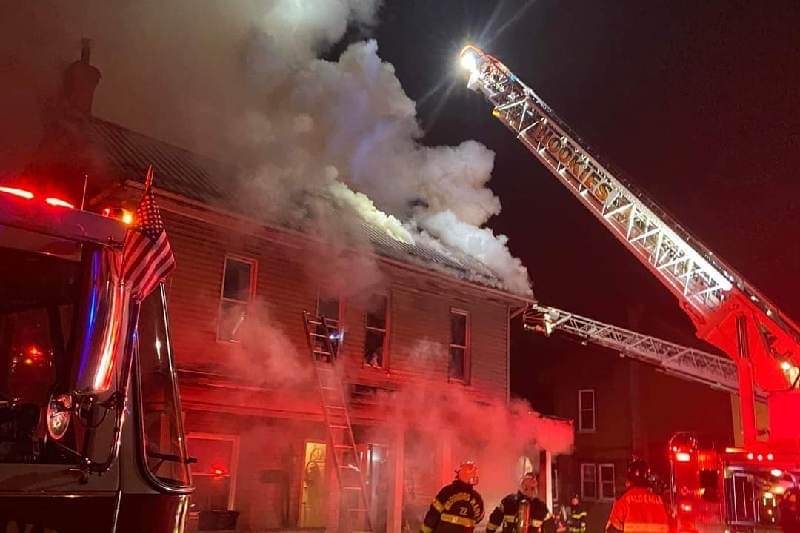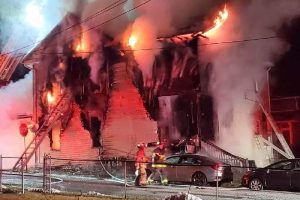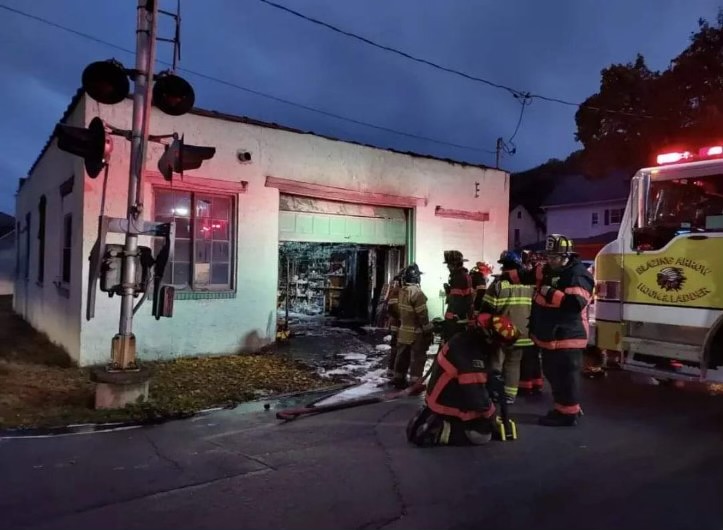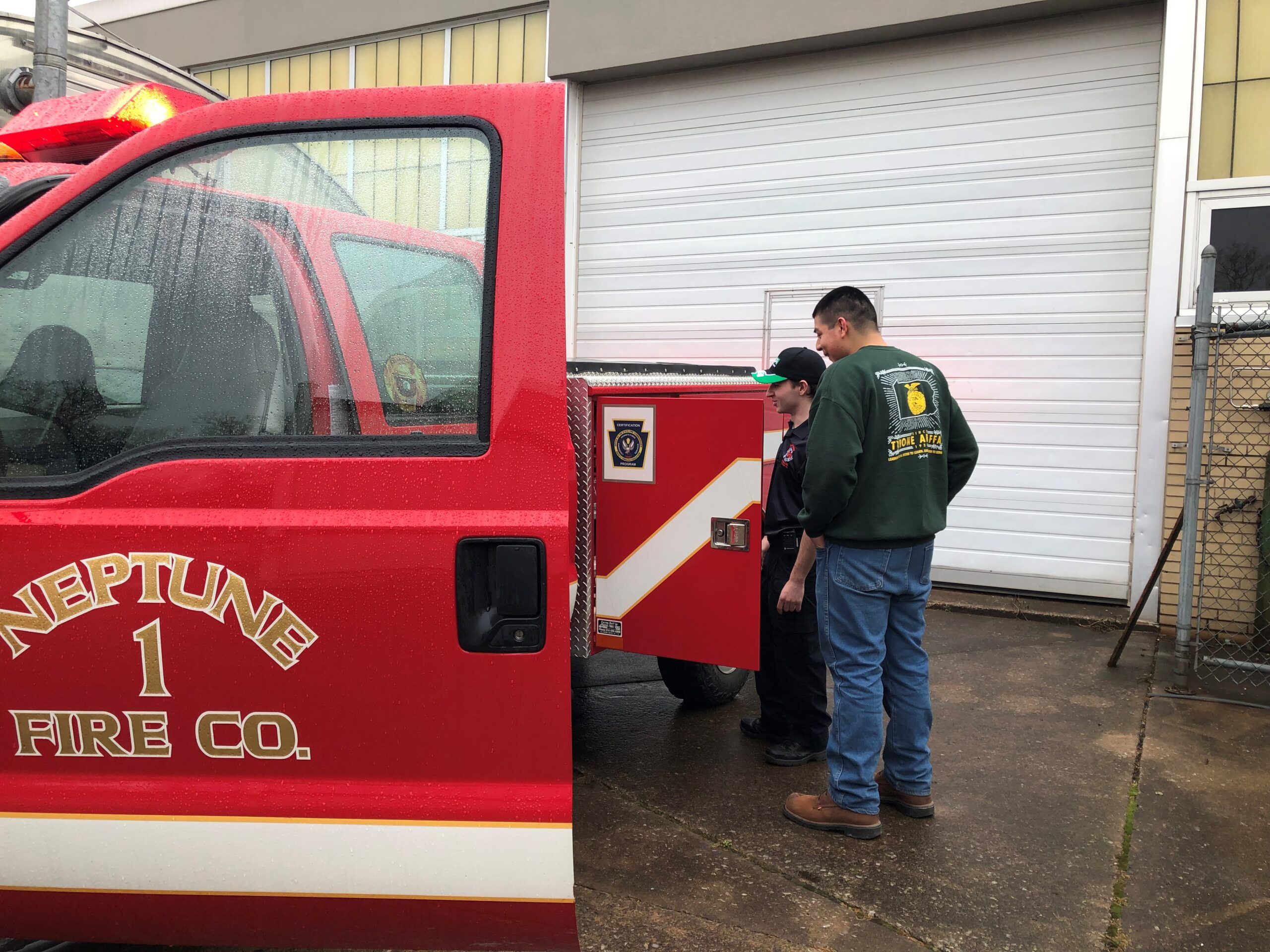Tyrone Wrestles With Fire
The Eagle Eye has been investigating the issue of fires in Tyrone for most of the school year. This story is one part in a four part series.
Tyrone firefighters working to extinguish a Washington Avenue house fire. A string of recent fires has made the issue a “hot” topic in Tyrone.
Tyrone has suffered several high-profile and costly fires in its 166-year history. Most notably the 1972 Pennsylvania House Hotel fire that resulted in 12 deaths, and the natural gas explosion in downtown Tyrone that killed one person and injured five more in 2021.
But beyond major events like these that grab headlines, a number of other fires in the past several years have made fire prevention a topic of much debate in Tyrone.
Through Pennsylvania’s Right-to-Know Act, The Eagle Eye obtained copies of all fire reports from the Tyrone Police Department from January 2020 to November 2022.
In that three-year span, there were 93 fires reported to Tyrone police within the borough. Twenty-three in 2020, 38 in 2021, and 32 in 2022. These reports do not include fires that occurred in townships outside the borough lines.
Recent Tyrone Fires
Of the 93 incidents that were reported over three years, some of the more recent serious fires were:
- In July of 2021, a natural gas explosion shook downtown Tyrone, killing one and injuring five.
- In February 2022, a fire destroyed a single-family home on Washington Avenue.
- On New Year’s Eve 2022, a fire on Back Vail Road severely damaged another home.
- In July 2022, a fire on Pennsylvania Avenue displaced a dozen Tyrone residents from two homes just yards away from the location of the 2021 gas explosion.
- In October 2022, another fire destroyed a local business in Tyrone.
- In March 2023 a residential fire killed one person in Snyder Township.
The cluster of fires led to rumors in town that they were in some way connected, which was, in part, what prompted this Eagle Eye investigation.
However, Tyrone police chief Jessica Walk said that all fires are investigated and the police department does not believe that any of them are connected.
No criminal charges have resulted in any of the recent fires in Tyrone, including the 2021 natural gas explosion.
“I think for the most part people assume that the fires are related to one another, but there is no connection to any of them,” said Walk, “It has been unfortunate for the town to have that many fires recently.”
Most of the 93 fires reported to Tyrone police were small and contained, resulting in no serious injuries or major structural damage.
However, there has been enough public concern that Tyrone Borough Council has debated the issue several times since 2021, even convening a special meeting in January 2023 to discuss requiring fire inspections for commercial and rental properties in the borough.
Despite much discussion over the course of several years, there is still a lack of consensus on the borough council on what, if anything, to do about the perceived problem.
The issue was seemingly put to rest in April when borough council voted 3-2 to abandon the idea of requiring regular inspections for any structures in the borough.
January Special Meeting
At the January 2023 meeting, the idea of adopting mandatory fire inspections for downtown businesses and/or rental properties was supported by a few borough council members but widely criticized by local landlords and others on the council, who called the idea too expensive and a potential violation of tenants’ privacy.
Local landlords argued that fire inspections would increase the cost burden on tenants, and would be a waste of landlords’ time.
Landlord Jessica Brenneman told the Tyrone Daily Herald that she opposed the idea.
“When do these [inspections] take place?” Brenneman asked. “If they’re taking place during the day, who’s paying my wage to take the time off from my job to go meet an inspector?”
However, certified fire inspector and Tyrone resident Jay Young, who served briefly as Tyrone’s fire inspector, but resigned shortly after taking the office, said Tyrone could benefit from requiring both rental property and commercial fire inspections.
Young, who has an extensive professional background in fire investigations, said that because many homes and commercial buildings in Tyrone are well over 100 years old and lack firewalls, they are especially susceptible to quickly spreading fires.
“The fire starts in the basement and all of a sudden the fire is in the attic. There are no stops in between the walls,” said Young. “This can cause fires to become a big problem very quickly and spread to neighboring homes.”
At the January special meeting, council member Bob Dollar said he was in favor of a commercial inspection program, stating that he did hundreds of safety inspections for the fire department when he lived in Utah.
However, Dollar did not support requiring inspections of single-family rental homes and in April 2023 he voted against pursuing the issue of inspections any further.
A Tenant Point of View
No local tenants attended the January meeting to express how they felt about fire safety inspections, but at least one family that has been affected by fires would like to see stronger code enforcement in the borough.
Tyrone tenant Lindsey Burket and her family were displaced twice by two house separate house fires in Tyrone over the course of six months in 2022 (See related story).
Burket thinks that stricter code enforcement could have prevented at least one of those fires.
“We called the code enforcer so many times. We told him what was not being done and how it was unsafe and his response was always that he was investigating it. I fully believe places should be better inspected,” said Burket.
According to Tyrone Borough Manager Ardeen Latchford, approximately 60 percent of the residential properties in Tyrone are rentals.
Current Tyrone Fire Code
The existing Tyrone municipal code already requires that all “hotel buildings, nursing homes, lodging houses, boarding houses, and dormitory buildings” have an approved smoke detector in every sleeping room.
The ordinance also states that “all multiple-family dwellings having more than one dwelling unit” must be equipped with “a minimum of one approved smoke detector for every 800 square feet of occupied floor space per floor.”
The borough’s Fire Marshal is authorized to enforce the code and may “as the Fire Marshal deems appropriate for the public health, safety, and welfare make inspection of any structure to verify compliance.”
But the issue with the ordinance, as currently written, isn’t giving the borough permission to conduct inspections, it is empowering and structuring enforcement, according to Council Vice President David Snyder.
“At present, the Fire Marshal has no proactive mandate or regularly scheduled inspections. They also cannot do it alone if we are to place such a schedule on their shoulders,” said Snyder.
The current code is also limited to smoke detectors and does not mention carbon monoxide detectors or fire extinguishers, nor does it allow for the inspection of properties for other fire hazards.
Young does not understand why many of his fellow property owners are against codes or inspections.
“As a rental property owner myself, in my lease, I have a provision in there that every six months I can come in and inspect my property. And they sign off it,” said Young.
The question of who would conduct inspections also caused controversy among some landlords.
At the November 2022 borough council meeting several landlords expressed concern that any proposed fire inspections might be conducted by the borough code enforcer Marvin Frazell, who is himself a rental property owner in the borough.
“I don’t believe that having a competing business coming to inspect your business looks good…You should give some thought to that being a conflict of interest,” said property owner David Brenneman.
Other Fire Codes in the Region
Regular fire inspection ordinances aren’t unheard of in the area, but they are the exception rather than the rule.
Borough Manager Ardean Latchford said that he contacted other municipalities of similar size in the area including Martinsburg, Roaring Spring, and Bellwood and none of them currently require regular fire inspections.
However, the two largest municipalities in the area, Altoona and State College, already have local ordinances and fire safety regulations for both business and rental property owners.
Altoona’s fire safety ordinance requires that all commercial structures and residential buildings that contain three or more units be inspected biannually.
The Centre Region Council of Governments adopted a county-wide inspection program in 1997 that requires fire safety inspections of all commercial properties and rentals at least every 36 months. Only single-family, resident-owned homes are exempt.
Participating municipalities are State College Borough, College Township, Furguson Township, and Patton Township.
Blair County does not have a similar program and does not require regular fire inspections.
One important difference that was discussed at several council meetings is that Altoona has a professional fire department that is mandated to perform all inspections in the city.
While Tyrone does have two fire departments, unlike Altoona, they are both all-volunteer, so the manpower to perform inspections is an issue.
But according to Neptune Fire Chief Alan Walls, the lack of a professional firefighting force does not necessarily mean that Tyrone could not implement such a program.
At the January special meeting Walls said “I think the inspections can be done. We have six borough chiefs, deputies, and systems, I think we could.”
Conflicting Viewpoints
Shannon Rice, owner of The Brew Coffee and Tap House said that she would welcome annual inspections of her business for fire safety.
“I don’t look at it as an intrusion; I look at it as we value your life, we truly believe that this is important,” Poust told the Daily Herald in January.
Councilman David Snyder supported greater awareness and education on fire safety but stopped short of supporting an ordinance that would require inspections of local businesses. In January he also said that he opposed inspection requirements for residential buildings.
“[I’m] 100% behind the education, I think if we were to take what’s already on the books, and get it out to the hands of the property owners, I think that’s phenomenal,” said Snyder.
Councilman Rob Poust expressed his support for a borough ordinance to require fire inspection for all commercial properties.
The majority of the property owners who spoke at the January meeting were opposed to the idea, citing financial costs and privacy issues.
Fire inspector Jay Young noted that as a property owner himself, he supports regular inspections.
Young also supports requiring all commercial property owners and landlords to install and maintain a smoke detector, a carbon monoxide detector, and a fire extinguisher in their businesses and rental properties.
Current Pennsylvania law requires smoke detectors and carbon monoxide detectors, but not fire extinguishers. But without regular inspections, there is no way to verify if landlords are complying with the mandate.
“If we can just save just one life through the enforcement of codes it would be worth it,” said Young.
However, Young is frustrated that the idea doesn’t have more support on the council and does not plan to advocate for any specific proposal in the future.
“I’m all for fire safety, but I’m not going to buck the system anymore. Because I’ve tried since I’ve been here, but it’s not working,” said Young.
Young said that without any consensus on inspections, he would at least like to start with better education, something with which everyone seems to agree.
“You know, there’s a Fire Prevention Week, and that’s a good place to start. But as far as I’m concerned, every day, every week, every month, is fire prevention,” said Young.
Council Tables the Issue in March
There was much discussion but no specific recommendation was made or vote taken at the January meeting and the issue of fire codes was not on the February council agenda, but it was discussed again at Council’s March meeting.
Council Vice President David Snyder brought the issue up and voiced his support for some kind of inspection requirement for downtown businesses, but also repeated his opposition to inspections for rental properties.
Council member Bob Dollar apologized for putting the fire department “on the hot plate” at the January meeting but wanted to hear more discussion. Mayor Bill Latchford said that he would also like to discuss the issue with the fire chiefs again before making any decisions.
Council Votes Down Inspections in April
In April, the Borough Council finally put the issue to rest, voting 3-2 against formulating a plan for safety inspections in the borough.
Councilmen Bob Dollar, Bill Wiser, and Mayor Bill Latchford were the three votes against inspections, while Councilman Rob Poust and Sarah Hunter voted to continue investigating the issue.
Poust suggested that if the burden was too much for the fire department, the borough should consider outsourcing inspections.
Hunter said she would like to continue seeking a program that would ensure safety for residents, especially in light of recent fires.
Council member Bill Wiser opposed that for financial reasons.
“With our tax base, I’m sorry, we just don’t have the monies to hire someone else to do this. And it’s just way too much for this kind of a community,” said Wiser.
Mayor Latchford suggested focusing on education and possibly distributing free fire extinguishers and smoke detectors at events like National Night Out.
Council Vice President David Snyder, council member Ken Patterson, and council member Charlie Mills were not present for the meeting and did not vote.
Are Fire Codes a Dead Issue?
When asked about his stance on the issue, Snyder said, “Fire safety inspections remain an interest of mine, and I would personally like to see us adopt some measure, whether it is the inspection program itself or a resource of equipment, such as detectors and fire extinguishers, for tenants/land owners who may not be able to afford them.”
However, Snyder also said that if he had been at the April meeting he likely would have voted with the majority to suspend consideration of a fire code at this time.
“Logistically speaking, until we determine how we will implement such an initiative, I probably would have voted no due to it being a premature concept until we had a strategy in place on how to implement it,” said Snyder.
But Snyder also said that he still has interest in pursuing an inter-municipal or regional approach to addressing the issue in the future.
“The hope, at least for me, is to take what we currently have on the books and restructure it so that inspections are handled by a team of capable individuals on a regular basis, not placed on a single individual on an as-needed basis. These inspections are handled by entire departments in other areas. We currently have a code department of one, and one Fire Marshal, who isn’t even full-time,” said Snyder.
So while the council seemed to have put the issue to rest, it is possible that it could be addressed again in the near future.
“The issue is dead, in the sense that the vote was taken to not move forward,” said Snyder, “[But] we are allowed to bring up the issue again at any time, so in my mind, no issue is ever truly dead so long as council members don’t see it that way.”
Until then, Tyrone residents hope that tragedies like the natural gas explosion in July 2021 or the fire just blocks away in July 2022 do not repeat in July 2023.
Special thanks to the Tyrone Daily Herald for their contributions to this investigation. While the Eagle Eye conducted its own interviews whenever possible, this story would not have been possible without the reporting done by the Herald.
Also, while Elijah Knarr was the main writer for this story, it was very much a group effort by most of the seventh-period Eagle Eye class.

Hello, this is Elijah! He is a senior this year, his second year in the Eagle Eye. Some of his favorite activities are playing soccer and hanging out...


















